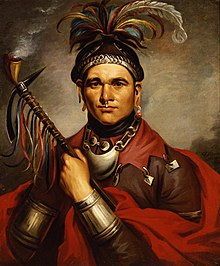Cornplanter
John Abeel III or Gaiänt'wakê (Gyantwachia – "the planter") or Kaiiontwa'kon (Kaintwakon – "By What One Plants"),[1] generally known as Cornplanter was a war chief of the Seneca tribe. He was also Dutch. His father was a Dutch trader, and his mother was a Seneca woman.[2] He was born at Canawagus in New York. He fought in the French and Indian War and the American Revolutionary War. He initially wanted neutrality, but later was allied with the British. After the war, he was a negotiator between the Americans and Seneca people. He signed the Treaty of Fort Stanwix (1784), the Treaty of Fort Harmar (1789) and the Treaty of Canandaigua (1794) These treaties gave up Native land to the United States. Cornplanter invited Quakers to teach young Natives. Natives did not like this that much. Cornplanter believed that Natives should not resist whites. He also believed that Natives should peacefully give up lands. Many Natives were against his views. As a result, Red Jacket replaced Cornplanter as the Seneca leader. Conrplanter later got land in Pennsylvania and retired there.[3][4]
Related pages
changeReferences
change- ↑ Abler, Thomas S. Cornplanter: Chief Warrior of the Allegany Senecas (The Iroquois and Their Neighbors). N.p.: n.p., n.d. Print.
- ↑ Abler, Thomas. Cornplanter: Chief Warrior of the Allegany Senecas. Syracuse University Press, p. 13.
- ↑ "Cornplanter | Seneca leader | Britannica". www.britannica.com. Retrieved 2022-08-14.
- ↑ "Cornplanter - New World Encyclopedia". www.newworldencyclopedia.org. Retrieved 2022-08-14.
